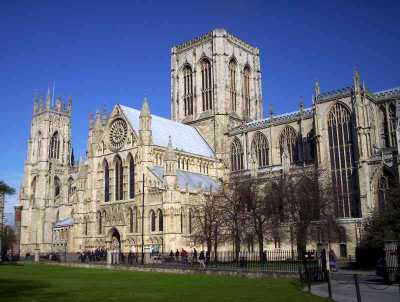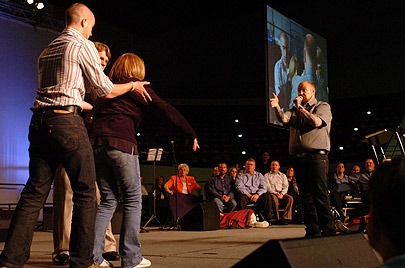Well, first off might I start by bidding you a good evening (or good night if you want to be pedantic), or indeed good morning if you’ve already changed your clocks. It has been far too long since my last update and I do feel slightly guilty, but university work has been a priority recently and has put me off writing to you for a while. Nonetheless, I’m writing now and on a topic which I promised to write about a few months ago, after I’d written my essay on it. I’m pleased to say that my Sources of Theology essay has been completed and I would like to now share with you some of my thoughts that have arisen from researching and studying said topic.
Ladies and gentlemen, boys and girls, theologians and bored people with nothing else to read – may I present the Beginner’s Guide to Theology.
Let’s start by outlining the basics, firstly and perhaps most importantly please by no means attempt to do any theology based on what is written here, for it is in no way an actual guide to theology; I just couldn’t think of a snazzier title. Secondly and a little more vital to the rest of the ‘article’ (can I call it that?) is the fact that to do theology, us theologians must look at four different sources on which to base our theories; these being scripture, tradition, experience and reason. I must stress that throughout this piece I will be coming at this from the angle of reason, as I (would like but perhaps incorrectly) think of myself as a philosopher – placing higher value to conclusions that are arrived at using the power of human rationale. I will of course offer both positives and negative views on each of the four sources.
Shall we begin?
Before we do, we should probably try and establish what theology exactly is. We know the ‘theo’ bit comes from the Greek word ‘theos’ (θεός) meaning ‘god’ and as we’ve all been taught in secondary school that ‘ology’ means ‘the study of’, giving us ‘the study of god’, but theology encompasses much more than just studying God. I think Anselm hit it on the head with his “faith seeking understanding” definition; theology attempts to provide explanations as to why people believe and practice what they do, it tries to make sense of things so that one can understand it themselves for example the nature of God, the person of Christ etc. Without theology, so much more of the world’s religious population would be ignorant and leading a spiritual path that is flawed due to their lack of understanding of their faith. Hence why to me, theology is one of the most important disciplines (if one may call it that) there is.

Now that we have some sort of understanding as to what theology actually is, we can make sense as to what these ‘sources’ are used for. The first such source is that of scripture; the name should pretty much give it away, this is concerned with using the religious text as the basis for theological theory.
Obviously the most compelling and perhaps the most valid argument is that theologians should be basing their theories on scripture alone as it is the core text which gives the religion its founding, laws and doctrine. Orthodox sects of Christianity would agree with this statement without question and why not? It makes perfect sense. All practising believers will constantly refer back to it for guidance and support, it is believed to be the inspired ‘word of God’ and through which we are granted knowledge of him, how can it possibly be disputed as a source for theology?
One word: interpretation. There are three major frameworks when it comes to the interpretation of scripture (and the other sources as I’ll discuss later), liberal, orthodox and liberation. Liberals (like myself and as the name suggests) read the Bible with an ‘open mind’, interpreting passages in different ways be it metaphorically or allegorically. The liberals don’t just take what is there as ‘gospel’ (please pardon the pun!) As earlier mentioned, orthodox will read the Bible strictly, allowing little room for interpretation. The liberationists will interpret the Bible as a narrative that is relevant to only them, making parallels with biblical stories to events suffered by groups of the oppressed.
It’s clear to see then that it is possible for there to be “as many opinions as there are people” (Vincent of Lérins), so how is it possible to establish a theology upon which we are all agreed?

The second such source is tradition. This one is fairly simple to explain, hence the picture of the magnificent church to the left. Using tradition as a source for theology is to look at Christianity’s past and the establishment of the Church.
Tradition perhaps cannot be used without also using scripture as one is based on the other, however both Vincent of Lérins and Irenaeus appear to speak pejoratively of scripture both stating that it cannot be relied on by itself and that one must turn to tradition in order to strengthen the credibility of using biblical sources. The strength of tradition, they argue, is in its universality and its power (speaking contextually about the established church in Rome). Irenaeus argues that knowledge of scripture can only be gained by following tradition, as such knowledge has passed through generations of appointed bishops, which apparently can be traced back to the apostles.
Obvious problems here with tradition though are again the different interpretations of it, the main difference being between liberal/liberation and orthodox. Orthodox argue against the two ‘Ls’ claiming that tradition makes religion a human-centred affair rather than a God one, thus reverting back to scripture alone. An argument I would have follows the same line of thought as an orthodox theory, how can we place trust in human ideas and establishments, a) because it is human attempting to formalise the divine and b) because the established church has always had a troubled history.

The third source and one which perhaps is met with the most scepticism especially in the 21st Century is experience.
If we take the example of a so-called ‘religious experience’ like that featured in the picture [right] of the Toronto Blessing, to what credence can one give to such events which many believe are merely demonstrating mass hysteria? People rolling around the floor, seemingly possessed does not appear to be divine action working through one’s body. (If you don’t believe me – http://bit.ly/emYQlW). Many theologians, although philosophers is probably more suitable in this instance, adopt the term ‘neruotheology’ to explain that these such experience of divine power are caused by nerve activity in the brain; this activity can either be an opening for God to enter one’s body, or perhaps more realistically just an event in the brain.
Some may argue however that experience is key when doing theology, experience is one’s manifestation of what scripture and tradition stand for; one cannot be religious without experiencing it. Perhaps if one was to do some form of ‘personal theology’ then experience would be vital and indeed maybe even essential – who can deny what you yourself have experienced?

Reason is the final source of theology and is one that is more often than not, frowned upon. Reason sees the inclusion of science and philosophy into theology.
Already there are problems with using science when discussing something religious, they are two contrasting subject matters and some argue that they cannot co-exist let alone support each other. Ironically, there is a rational and logical reason as to why reason is not universally accepted; how can one apply human ideas which are arrived at using human logic (which is sometimes flawed), to something that is inherently perfect and without flaw?
However, one may use reason to explain such experiences like the mentioned Toronto Blessing and we have seen evidence of this in neurotheology. Reason can also be used (using a liberal approach) to reinterpret old and outdated doctrine that no longer have any relevance in a contemporary world.
I am believer in reason, and the following are my reasons why.
Contemporary theology must be based on reason, the marriage of science and religion should and probably would bring back to life the God whom Friedrich Nietzsche claimed we had killed back in the 1940s. Humanity is God’s creation and we work on logic and rational thought, God gave us this capability, so how and why is it that we should not think about God in the same way?
The philosopher is the theologian’s friend and enemy at the same time. The philosopher can pull apart scripture, tradition and experience by using simple, pure logic; but can also argue for the existence of God. Reason can make sense of all different interpretations and gives reasons for each.
Perhaps for me, the most compelling thought is that if one were to look at the Bible, it tells us contradicting qualities of God. The Old Testament shows us that he a vengeful and jealous God, whereas the New states he is loving, kind and merciful. If one were to take scripture as the source, how can the theologian reach a wholesome theory that is without flaw and contradiction? Logic and reason does not allow for contradiction and we see this in mathematics, if 2+2=4 then 4-2 cannot equal 1.
I cannot stress how important reason is, it is the basis for all human thought and for me, should be the utmost important thing to consider when doing theology.
Concluding what is the longest blog post I’ve ever written, it is clear to see that all four sources have to be used in conjunction with each other when doing theology. Tradition is based on scripture, experience brings to life the tradition, reason can explain experience – you get the picture. I have made my clear my views in a slightly rambling way (such as is the tradition of this blog), but no matter what anyone says, to be a theologian you must use all four to reach a solid theory.
Goodnight, ‘God’ bless.
– Clarke
